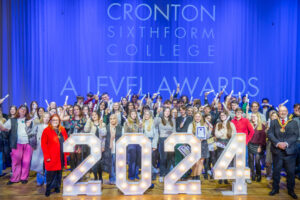Geography Students Investigate Manchester
Sixty five first year Geography students at Croton Sixth Form College visited Manchester City Centre for a day of investigation and study on how the city has changed over the last 100 years.
A key part of the first year Geography course is to complete an independent investigation focusing on how towns and cities have changed throughout time, with Manchester being a prime example.

The day began with a tour of local landmarks to show the diverse and wide range of districts, from entertainment areas to retail, residential, political, quirky and cultural places. Areas included Canal Street, China Town, Manchester Town Hall, Manchester Library, Spinningfields, Market Street, The Arndale Centre and the Northern Quarter.
Some of the topics the students focused on included, ‘The distribution of homelessness across Manchester city centre’, ‘The changes to Canal Street after the legalisation of homosexuality in 1969’, ‘How historic locations such as Manchester Town Hall were not bombed during World War 2’, ‘The constantly changing face of shops within Manchester’, ‘How has the Northern Power House concept changed and will continue to change Manchester?’ and ‘How will High Speed 2 change Manchester?’

Following the trip, one student commented, “I never knew Manchester had changed so much over quite a short period of time. Manchester was famous for its cotton mills over 150 years ago to the stage that in Australia that bedding sheets are nicknamed ‘Manchester’ but now this industry is mainly gone but a thriving multi-cultural city has developed with high levels of regeneration.’
Another student was shocked to hear how many gay venues used to have 2 bars; the front bar and a secret bar behind which was only accessed with a secret password. These bars were often raided by police in the 1950’s and 60’s due to the derogative nature of homosexuality. Today however, Canal Street is now a popular place to visit with over 25 bars and restaurants open to all sexual orientations, with Manchester pride supported by many local community groups and the police.”



